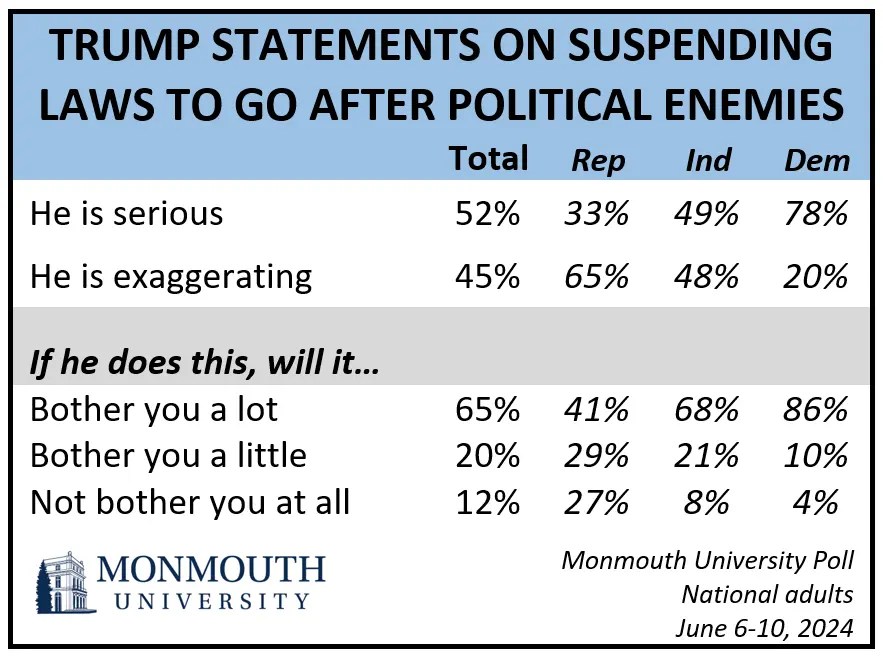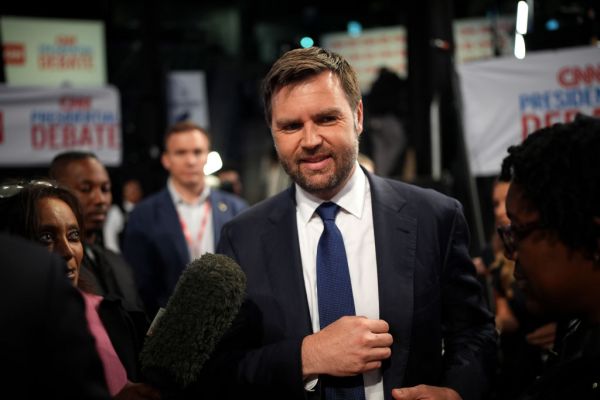The Never Trump narrative about Republican politicians who’ve converted to Trumpism goes something like this:
On some level, the convert understands that what he’s supporting is morally and civically foul. His or her “true self” finds the authoritarian project repugnant. But human beings are weak, especially when their ambition has convinced them that they’re destined to lead. If the path to power now runs through post-liberalism, they end up reasoning, destiny commands that they follow that path. Before long, they’re warming up the crowd at Trump rallies.
I’ve spun that narrative in this newsletter many times myself about figures as diverse as Elise Stefanik, Marco Rubio, and J.D. Vance. Reading through John McCormack’s excellent profile of Vance this morning, though, I wonder if I’ve gotten it wrong.
Why should anyone assume that J.D. Vance’s “true self” has reservations about serving a coup-plotting sociopath?
Right, right, I know: The 2016 version of Vance was clear-eyed about the threat from Trump and Trumpism, as John describes in detail. “Trump is cultural heroin,” the future senator wrote at the time, a pregnant metaphor given MAGA’s popularity in rural America. “He makes some feel better for a bit. But he cannot fix what ails them, and one day they’ll realize it.” Surely that’s evidence of what his “true self” believes.
Is it, though? Or is that just how a normal person comprehends extreme cynicism?
One could easily argue that the current iteration of Vance is the “true” one and the 2016 version was fake. When he called Trump “cultural heroin” eight years ago, he had every reason to assume the new GOP nominee would lose ignominiously to Hillary Clinton and end the right’s infatuation with nationalism. The smart bet at the time for an ambitious young conservative from the professional class was to ingratiate himself to the political establishment by denouncing an amoral populist insurgent. They would reward him for it later when he entered politics himself.
Vance miscalculated. Then he adapted.
Normal people puzzling over which version of Vance is his “true self” should consider the possibility that, for politicians of extreme ambition, there is no “true self” as the concept is commonly understood. They are what they need to be to get ahead, period, irrespective of moral or civic considerations. They’re less “converts” than reptiles, a distinct species.
J.D. Vance is good enough at being what he needs to be to have made himself the frontrunner for a national ticket before he turns 40. And you know what? Good. This country deserves him.
In calling him the frontrunner, I’m speculating. But it’s informed speculation.
Reporting on Trump’s VP deliberations universally names Vance as one of three finalists along with Rubio and North Dakota Gov. Doug Burgum. On Thursday, Axios pointed out that Donald Trump Jr., one of Vance’s boosters, is scheduled to speak immediately before the vice presidential nominee at the Republican convention next Wednesday—that’s supposedly been in the cards for weeks. It would make sense to have a fan introduce Vance to America.
Also on Thursday, Politico reported that the mayor of East Palestine, Ohio, is tentatively set to speak on Wednesday as well. Ohio is Vance’s home state, of course, and redressing the 2023 chemical spill in East Palestine has been a pet cause of his. The head of the local government would be an obvious choice for Republicans to tout Vance’s concern for “the forgotten man” on a big stage.
Even before we had those tea leaves, I assumed he’d be the pick. Donald Trump’s Republican Party is a kakistocracy and Vance is plainly the most loathsome figure among the final three.
What I can’t figure out, though, is what Trump thinks he’ll gain from putting Vance on the ticket. Normally, there’s some discernible electoral purpose underlying a vice presidential choice, as there was when Trump made evangelical favorite Mike Pence his running mate in 2016. What’s the supposed electoral purpose in this case?
“National victory runs through the Rust Belt and Vance is from the Rust Belt.” Right, but it’s not like he was a juggernaut in his one race for office. He ran behind every statewide Republican candidate in Ohio’s general election in 2022 and was at dire risk of losing the GOP Senate primary before Trump rescued him. Sen. Mitch McConnell’s super PAC ended up spending more than $30 million to drag him over the finish line in November despite the fact that Ohio had become a solidly red state in the Trump era.
Trump doesn’t need help in the Midwest from a candidate whose career wouldn’t exist without him. And even if you insist on believing that Vance is worth a little something in Wisconsin, Michigan, and Pennsylvania, is he worth more than Marco Rubio is worth in enticing Hispanics and college grads nationwide to vote Republican this year?
“Vance is a populist and Trump needs help with populist voters.” To believe this—and some do—is like believing in 2012 that Barack Obama needed a black vice president to help him with African American voters. Trump will win the populist vote by Saddam Hussein margins with or without J.D. Vance, notwithstanding whatever disappointments those voters might harbor about his first-term record. They’re not switching to a “globalist” neoliberal with dementia or a progressive black woman from San Francisco after four years of griping about the current White House. And interest nationally in Robert F. Kennedy Jr. has been fading for months.
Frankly, at the rate things are going, Trump could underperform with populists in November and still win easily. But if he’s keen to enhance his appeal to an otherwise reluctant constituency, wouldn’t he be better off with a traditionally conservative running mate like Rubio or Burgum to help convince jittery suburbanites that a second Trump term will be “normal”?
“Vance is young and American voters are desperate for younger leaders.” Leave it to the GOP to respond to widespread anxiety about leaders who are too old by offering leaders who are too young. Vance isn’t just young, after all, he’s really young. The youngest president in American history was Theodore Roosevelt, who ascended to the office a few weeks shy of turning 43. The youngest person elected to the presidency was John F. Kennedy, also 43. Vance won’t turn 43 for another three years.
Donald Trump will turn 80 before then.
Vance has all of 18 months’ experience in government at any level, less than any modern president except his would-be running mate. Burgum, by comparison, has been governor for nearly eight years, and Rubio has served in the Senate for more than a decade. Lacking experience is arguably more of an asset than a liability for a national hopeful in 2024, but I don’t know that Americans want to place another high-stakes wager on a potential president’s fitness for office after suffering through the trauma of the Trump and Biden administrations.
And insofar as Vance’s youth places him “closer to the problems of young people,” it’s worth noting that Rubio is still young enough to have two children in high school. And, like most young Americans but very much unlike J.D. Vance, Rubio doesn’t get to pay his kids’ tuition with earnings from a venture capital firm he launched.
“Having Vance next in line will discourage the Senate from removing Trump from office.” Yes, really, this claim is being made semi-seriously by none other than Donald Trump Jr. Supposedly, the dreaded RINOs in Congress will impeach and remove Trump from the presidency lickety split if an establishment darling like Rubio is poised to replace him but not if a dogmatic populist like Vance is.
It’s pure paranoid idiocy. If we’ve learned nothing else in the last five years, we should at least have learned that Donald Trump could blow up the headquarters of the Republican National Committee and still wouldn’t come close to drawing 67 votes in the Senate to oust him. So long as his support among the right-wing base holds, there’s nothing he could do to turn a meaningful number of congressional Republicans against him. Literally nothing.
“Having a MAGA convert like Vance on the ticket will help persuade anti-Trump voters to convert as well.” The problem with this argument is that Rubio and Burgum are also former anti-Trumpers so they can fill the same niche. If anything, Rubio would be a more effective public evangelist for conversion because his criticism of Trump played out in the spotlight of a presidential primary in 2016.
But even if you grant that Vance would be the best man for this particular job, it’s easy to imagine how it might backfire. Democrats will bombard Republicans with ads showcasing Vance’s acidic criticism of Trump eight years ago—“cultural heroin,” “America’s Hitler,” and numerous other uncomfortable soundbites. Having digested those ads, will the average Trump-leery voter perceive Vance’s sudden enthusiasm for Trump as a stirring call to reconsider their own feelings about him?
Or will they conclude that Vance is just another phony Republican sycophant babbling insincere praise about Trump that needn’t be taken seriously?
There’s no good electoral argument for putting Vance on the ticket. Burgum would be a do-no-harm pick who can help bankroll the campaign and whose normalcy might reassure swing voters. Rubio could help expand the GOP tent demographically and give traditional conservatives reason to believe they’re still wanted in the party. Vance simply helps Trump further lock down the sort of populists who have been locked down for years.
So why does Trump seem poised to put him on the ticket?
I suspect Trump would agree that there’s no real electoral case for elevating Vance—before quickly adding that it doesn’t matter.
“Watching Biden’s slide in the polls, and sitting on hundreds of millions of dollars for an advertising blitz that would punctuate the president’s visible decrepitude, Trump’s team entered the summer believing that a landslide awaited in the fall,” Tim Alberta recently reported for The Atlantic. In a tight election like 2016 or 2020, the Republican nominee might feel obliged to make a “safe” pick like Rubio or Burgum to maximize his chances of winning.
But if he’s going to win comfortably anyway, why not choose a running mate with whom he’s ideologically and demagogically simpatico?
As John notes in his piece, all the worst demagogues in the MAGA movement are excited about a Trump-Vance ticket. Tucker Carlson, Steve Bannon, Charlie Kirk, and Trump Jr. reportedly support the idea—and why wouldn’t they? For eight years, the populist-nationalist political project has been consumed with seizing control of the Republican Party, purging it of “disloyal” classical liberals, and consolidating power in hopes of cementing the GOP as a post-liberal party.
Defeating Democrats has always been a secondary priority for them. That’s the essence of the Republican hostage crisis.
If your highest political ambition is making the American right safe for degenerate authoritarianism, who better to elevate by placing him on the national ticket than J.D. Vance?
Doug Burgum and Marco Rubio may not “know what time it is,” but J.D. does, as I noted in the first piece I wrote for The Dispatch. He’s endorsed doing “uncomfortable” things politically to navigate America’s “late-republican period,” including defying Supreme Court rulings if necessary. When asked if Mike Pence did the right thing on January 6, Vance has said no: As vice president, he would have abetted Trump’s coup attempt by refusing to certify Biden’s victory until swing states won by the Democrat submitted alternate pro-Trump electoral slates for consideration by Congress.
He’s an illiberal reptile for whom other illiberal reptiles practically glow with enthusiasm. Doesn’t this party, and this country, deserve him as Donald Trump’s running mate?
Look at this poll and tell me that the American right doesn’t deserve J.D. Vance:

“It would bother me a lot if the cult leader flushed the Constitution down the toilet in order to persecute his opponents” is now a minority position in the Republican Party. Adding Doug Burgum or Marco Rubio to the leadership of a movement like that would feel ridiculous. Not so with J.D.
For a pathological liar, Trump is often startlingly honest about his ambitions. And I appreciate honesty, especially in radicals, as it clarifies political outcomes. If he had hidden his authoritarian plans this year and won reelection by running exclusively on, say, sealing the border, the lesson of his victory would be cloudy and complicated. Did Americans choose post-liberalism or did they merely choose stronger immigration enforcement, unaware of the comprehensive post-liberal project being smuggled into the White House?
Trump isn’t hiding anything, though. Well, maybe he’s hiding a little—but when he’s already tried to overthrow the government, has been convicted of dozens of felonies, is openly celebrating having absolute immunity from prosecution for certain crimes he might commit as president, and is babbling about “retribution” to anyone who’ll listen, I’d say voters have received sufficient notice of what’s to come in a second term.
Having J.D. Vance on the ticket would further clarify the electorate’s choice in a way that Burgum or Rubio wouldn’t. Do Americans want to stick with the constitutional order, or are they ready to lean in to the idea that we’ve entered a “late-republican period”?
That’s the only consolation I can find in the prospect of another Trump presidency. America will deserve it. And the clearer it becomes what’s in store, the more deserving we’ll be.
Every civic agony Trump visits upon us, every constitutional crisis he causes, will be something the country collectively chose despite having every reason to know what awaited it. I won’t enjoy living through it, of course, but there’s always some moral gratification in seeing people suffer terrible consequences for their own terrible actions.
Moral gratification or schadenfreude, I suppose. To-may-to, to-mah-to.
And so the case against Vice President Vance is ultimately the case for Vice President Vance. He’s awful, but so is the modern right. And in a representative democracy, the people deserve to see themselves reflected in their candidates. Trump should give us what we deserve.







Please note that we at The Dispatch hold ourselves, our work, and our commenters to a higher standard than other places on the internet. We welcome comments that foster genuine debate or discussion—including comments critical of us or our work—but responses that include ad hominem attacks on fellow Dispatch members or are intended to stoke fear and anger may be moderated.
With your membership, you only have the ability to comment on The Morning Dispatch articles. Consider upgrading to join the conversation everywhere.